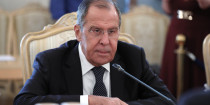Oct. 29 – “China is an important country in all respects. It is a country with which we want to develop our relations, and revive the historical Silk Road together,” Turkish Foreign Minister Mevlut Cavusoglu said yesterday, in a speech in the southeastern city of Sanliurfa, Xinhua reports. He noted that the Silk Road includes many issues, including those of economy and security.
President Recep Tayyip Erdogan was a prominent participant in the May 2017 Belt and Road Forum for International Cooperation in China; the country’s {Official Gazette} reported two days ago that Emin Onon, described as Erdogan’s “chief advisor” by Turkey Minute website, has been appointed Ambassador to China.
The pro-government newspaper {Daily Sabah} ran a story that same day reviewing the last decade of Turkish-Chinese economic ties, with an eye to how, “having gained momentum in the last decade, Turkish-Chinese cooperation is set to capitalize on further cooperation with additional joint investment projects to unlock the potential offered by the Belt and Road project.”
“Millennia-long ties between the Turks and the nation of dragons, China, have not always been marked with lucrative cooperation,” {Daily Sabah} wrote, but “history tells us that the two nations have enjoyed the benefits of trading on the ancient Silk Road…. China’s willingness to render the Belt and Road initiative as integrated into Turkey’s development strategy, will also help strengthen the exchange between China and Turkey.”
Among the economic cooperation underway or in the works mentioned by {Daily Sabah}, are ongoing negotiations on construction of the Edirne-Kars high-speed railway route, the agreement on China’s State Nuclear Power Technology Corp.’s construction of a third nuclear power plant in Turkey, and promotion of the use of direct renmimbi-lira currency transactions to finance trade and investment by the Chairman Xu Keen of the Turkish branch of Industrial and Commercial Bank of China (ICBC Turkey).
Xu told {Daily Sabah}, “we will strengthen the market surveys in Eastern Europe and the Black Sea region, while acting as the major partner to infrastructure projects including energy power plants, railroads, highways and others, in addition to other projects in Turkey and surrounding regions.”
Likewise, PowerChina (Power Construction Corporation of China) decided at the end of last May to establish its Eurasian regional headquarters operations in Istanbul. PowerChina Deputy General Manager Wang Bin explained, in opening the regional headquarters, that “Turkey is one of the most important countries along the Silk Road and has important regional advantages,”











